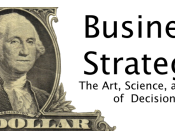ITESM Campus Chihuahua
Rogelio Israel Carrillo Hinojosa (A00757992) Competitiveness and Geoeconomy
Competitive Strategy: Techniques for Analyzing Industries and Competitors
Chapter 2: Generic Competitive Strategies
Business strategist Michael Porter has a simple view to business and how a business can create superior returns by applying a specific generic strategy, according to what the company is seeking for.
Cost leadership: A firm determine how to become the low cost producer in its industry. The sources of cost advantage are very diverse and depend on the structure of the sector. A cost leadership business can create a competitive advantage by reducing production costs and consequently increasing profits, therefore many companies are seeking to become economies of scale, in order to obtain preferential access to raw materials, distribution channels, etc. To achieve and sustain overall cost leadership, it is required to have:
Sustained capital investment and access to capital
Process engineering skills
Intense supervision of labor
Products designed for ease in manufacture
Low-cost distribution system
Tight cost control
Frequent, detailed control reports
Differentiation: Organizations strive for being different.
Businesses can stand out from their competitors by developing a differentiation strategy which is useful to develop a product or service with an added value, such as functionality, product quality or after sale support. A differentiation strategy is known as a broad scope strategy because the business is attempting to reach a wide section of the market. In order to make a successful differentiation strategy it is needed to include:
Strong marketing abilities
Product engineering
Creative skills (Attract highly skilled labor, researchers, or creative people)
Corporate reputation for quality or technological leadership
Focus: It implies a combination of the cost and differentiation policies directed at the particular strategic target. An organization focuses its efforts on one certain segment of the market and wants to become...


